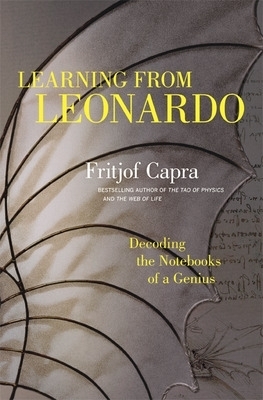
Learning from Leonardo; Decoding the Notebooks of a Genius
Seiten
2013
Berrett-Koehler (Verlag)
978-1-60994-989-1 (ISBN)
Berrett-Koehler (Verlag)
978-1-60994-989-1 (ISBN)
- Keine Verlagsinformationen verfügbar
- Artikel merken
Leonardo da Vinci was a brilliant artist, scientist, engineer, mathematician, architect, inventor, and even musician. But he was also a profoundly modern man. Not only did Leonardo invent the empirical scientific method, but Capra's study of Leonardo's notebooks reveals that he was a systems thinker centuries before the term was coined.
Leonardo da Vinci is celebrated as the archetypal Renaissance man. He made extraordinary discoveries in numerous fields and pioneered entire disciplines, among them fluid dynamics, aerodynamics, theoretical botany, and embryology. Leonardo's unique synthesis of art, science, and technology is not only fascinating intellectually but also very relevant to our time-it prefigures modern systems theory.
Our sciences and technologies have become increasingly narrow in their focus, unable to understand our multi-faceted problems from an interdisciplinary perspective; and our business and political leaders are often incapable of "connecting the dots." This is exactly what we can learn from Leonardo. As the author shows throughout the book, Da Vinci practiced a science and technology that honored and respected the unity of all life, recognized the fundamental interdependence of all natural phenomena, and connected the microcosm (the human being) with the macrocosm (the living Earth). That is exactly the kind of science and technology we need today.
Leonardo da Vinci is celebrated as the archetypal Renaissance man. He made extraordinary discoveries in numerous fields and pioneered entire disciplines, among them fluid dynamics, aerodynamics, theoretical botany, and embryology. Leonardo's unique synthesis of art, science, and technology is not only fascinating intellectually but also very relevant to our time-it prefigures modern systems theory.
Our sciences and technologies have become increasingly narrow in their focus, unable to understand our multi-faceted problems from an interdisciplinary perspective; and our business and political leaders are often incapable of "connecting the dots." This is exactly what we can learn from Leonardo. As the author shows throughout the book, Da Vinci practiced a science and technology that honored and respected the unity of all life, recognized the fundamental interdependence of all natural phenomena, and connected the microcosm (the human being) with the macrocosm (the living Earth). That is exactly the kind of science and technology we need today.
Fritjof Capra PhD, physicist and systems theorist, is a founding director of the Center for Ecoliteracy in Berkeley, California. The Center advances schooling for sustainability. Dr. Capra is on the faculty of the Beahrs Environmental Leadership Program of the University of California, Berkeley. He also teaches at Schumacher College, an international center for ecological studies in England, and frequently gives management seminars for top executives. Capra is the author of five international bestsellers, The Tao of Physics (1975), The Turning Point (1982), Uncommon Wisdom (1988), The Web of Life (1996), and The Hidden Connections (2002). His most recent book is The Science of Leonardo (2007).
| Erscheint lt. Verlag | 16.12.2013 |
|---|---|
| Verlagsort | San Francisco |
| Sprache | englisch |
| Maße | 165 x 243 mm |
| Gewicht | 822 g |
| Themenwelt | Sachbuch/Ratgeber ► Natur / Technik |
| Geschichte ► Allgemeine Geschichte ► Neuzeit (bis 1918) | |
| Naturwissenschaften ► Biologie ► Ökologie / Naturschutz | |
| ISBN-10 | 1-60994-989-7 / 1609949897 |
| ISBN-13 | 978-1-60994-989-1 / 9781609949891 |
| Zustand | Neuware |
| Haben Sie eine Frage zum Produkt? |
Mehr entdecken
aus dem Bereich
aus dem Bereich
Europa 1848/49 und der Kampf für eine neue Welt
Buch | Hardcover (2023)
DVA (Verlag)
48,00 €
Giordano Bruno - ein ketzerisches Leben
Buch | Hardcover (2024)
C.H.Beck (Verlag)
29,90 €


